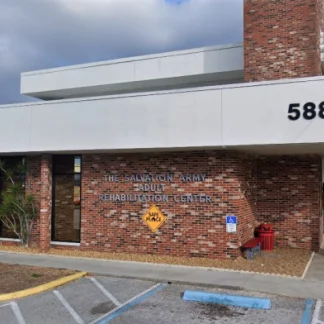Personal Enrichment Through Mental Health Services - PEMHS
Personal Enrichment Through Mental Health Services – PEMHS is a private rehab lo...
The Salvation Army Adult Rehabilitation Center in Saint Petersburg, Florida, provides an in-residence substance abuse rehabilitation program. This nonprofit rehab facility provides individuals with a safe, healthy, and clean environment and helps them overcome addiction through various services. Some of these include group and individual counseling, leisure activities, and spiritual direction through faith based therapies.
At The Salvation Army Adult Rehabilitation Center, individuals struggling with substance abuse addiction start down their path to recovery through holistic work therapy, spiritual direction, counseling, and life skills development.
This rehab offers a way to abandon substance reliance through its residential inpatient program.
Those who want to attend the inpatient residential substance abuse rehabilitation program at The Salvation Army Adult Rehabilitation Center must note that the no cost program runs for 180 days. During this time, those seeking recovery from drugs and alcohol receive work therapy programs that provide emotional, social, and spiritual assistance.
Eligible individuals will be provided with housing, counseling, and food to regain stability in their lives as they work to root out the cause of their substance abuse issues and overcome them.
Contact us for more information: (727) 541-7781

Connect with The Salvation Army Adult Rehabilitation Center by calling their admissions team directly.
(727) 541-7781 Website Get DirectionsGroup therapy is any therapeutic work that happens in a group (not one-on-one). There are a number of different group therapy modalities, including support groups, experiential therapy, psycho-education, and more. Group therapy involves treatment as well as processing interaction between group members.
In individual therapy, a patient meets one-on-one with a trained psychologist or counselor. Therapy is a pivotal part of effective substance abuse treatment, as it often covers root causes of addiction, including challenges faced by the patient in their social, family, and work/school life.
Life skills trainings involve all the skills a person must have in order to function successfully in the world. These include time management, career guidance, money management, and effective communication. Truly successful addiction recovery is based on the ability to not only live substance-free, but to thrive. Life skills teaches the practical necessities of functioning in society, which sets clients up for success in life, and therefore sobriety.
Recreational therapy (aka therapeutic recreation) uses creative and fun activities to help with addiction recovery. Recreational therapists lead patients in entertaining and engaging activities like sports or games; art (drawing, painting, sculpture); drama, music, and dance; and/or community outings (field trips) to improve patients' physical, social, and emotional well-being.
In individual therapy, a patient meets one-on-one with a trained psychologist or counselor. Therapy is a pivotal part of effective substance abuse treatment, as it often covers root causes of addiction, including challenges faced by the patient in their social, family, and work/school life.
Life skills trainings involve all the skills a person must have in order to function successfully in the world. These include time management, career guidance, money management, and effective communication. Truly successful addiction recovery is based on the ability to not only live substance-free, but to thrive. Life skills teaches the practical necessities of functioning in society, which sets clients up for success in life, and therefore sobriety.
Recreational therapy (aka therapeutic recreation) uses creative and fun activities to help with addiction recovery. Recreational therapists lead patients in entertaining and engaging activities like sports or games; art (drawing, painting, sculpture); drama, music, and dance; and/or community outings (field trips) to improve patients' physical, social, and emotional well-being.
Life skills trainings involve all the skills a person must have in order to function successfully in the world. These include time management, career guidance, money management, and effective communication. Truly successful addiction recovery is based on the ability to not only live substance-free, but to thrive. Life skills teaches the practical necessities of functioning in society, which sets clients up for success in life, and therefore sobriety.
Recreational therapy (aka therapeutic recreation) uses creative and fun activities to help with addiction recovery. Recreational therapists lead patients in entertaining and engaging activities like sports or games; art (drawing, painting, sculpture); drama, music, and dance; and/or community outings (field trips) to improve patients' physical, social, and emotional well-being.
Recreational therapy (aka therapeutic recreation) uses creative and fun activities to help with addiction recovery. Recreational therapists lead patients in entertaining and engaging activities like sports or games; art (drawing, painting, sculpture); drama, music, and dance; and/or community outings (field trips) to improve patients' physical, social, and emotional well-being.
Personal Enrichment Through Mental Health Services – PEMHS is a private rehab lo...
AA – Alcoholics Anonymous is a non-profit rehab located in Saint Petersburg, Flo...
Spencer Recovery Center is a private rehab located in St. Pete Beach, Florida. S...
Operation PAR - Medication Services is located in Clearwater, Pinellas County, F...